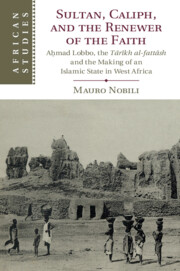Crossref Citations
This Book has been
cited by the following publications. This list is generated based on data provided by Crossref.
Syed, Amir
2020.
The Palgrave Handbook of Islam in Africa.
p.
93.
Østebø, Terje
2020.
Islam, Ethnicity, and Conflict in Ethiopia.
Salvaing, Bernard
2020.
The Palgrave Handbook of Islam in Africa.
p.
19.
2021.
Race and Diplomacy in Zimbabwe.
p.
346.
Nobili, Mauro
and
Syed, Amir
2021.
Introduction. The Caliphate of Ḥamdallāhi: A history from within.
Afriques,
Vol. 12,
Issue. ,
Syed, Amir
2021.
Political Theology in Nineteenth-Century West Africa: Al-Ḥājj ʿUmar, theBayān mā waqaʿa, and the Conquest of the Caliphate of Ḥamdallāhi.
The Journal of African History,
Vol. 62,
Issue. 3,
p.
358.
Pailey, Robtel Neajai
2021.
Development, (Dual) Citizenship and Its Discontents in Africa.
G. Novo, Marta
2021.
Handbook of Contemporary Islam and Muslim Lives.
p.
1.
2021.
Revolutionary State-Making in Dar es Salaam.
p.
330.
Diagayété, Mohamed
2021.
A note on Mawlāy ‘Abd al-Qādir b. Muḥammad al-Sanūsī and his relationship with the Caliphate of Ḥamdallāhi.
Afriques,
Vol. 12,
Issue. ,
Salvaing, Bernard
2021.
La question de l’influence de la Qādiriyya sur les débuts du califat de Ḥamdallāhi, à l’épreuve de nouvelles sources.
Afriques,
Vol. 12,
Issue. ,
Warscheid, Ismail
2021.
Quand le droit pense la politique : à propos de deux lettres d’al-Muḫtār al-Ṣaġīr al-Kuntī (m. 1847) à l’imam de Ḥamdallāhi.
Afriques,
Vol. 12,
Issue. ,
Bradshaw, Joseph M.
2021.
Race and military coalitions in the Middle Niger during the second half of the 19th century.
Afriques,
Vol. 12,
Issue. ,
G. Novo, Marta
2021.
Handbook of Contemporary Islam and Muslim Lives.
p.
447.
Nobili, Mauro
2022.
West Africa Seen from Moroccan Manuscript Archives.
History in Africa,
Vol. 49,
Issue. ,
p.
301.
Evrard, Camille
and
Pettigrew, Erin
2022.
Femmes du Sahara-Sahel : transformations sociales et conditions de vie.
L’Ouest Saharien,
Vol. Vol. 16,
Issue. 1,
p.
13.
Wright, Zachary
2023.
Scholars, Secrets, and Sultans: Clerical Authority in West Africa, 1450–1650.
The Journal of African History,
Vol. 64,
Issue. 2,
p.
248.
Thiam, Madina
2023.
The Caliphate, the Black Writer, and a World in Revolution, 1957–69.
The Journal of African History,
Vol. 64,
Issue. 2,
p.
174.
Syed, Amir
2023.
Mobility, Knowledge Transmission, and Authority in West Africa: Re-Reading Ivor Wilks’ Fieldnotes “Conversations about the Past”.
History in Africa,
Vol. 50,
Issue. ,
p.
293.
2024.
Black Soldiers in the Rhodesian Army.
p.
283.



